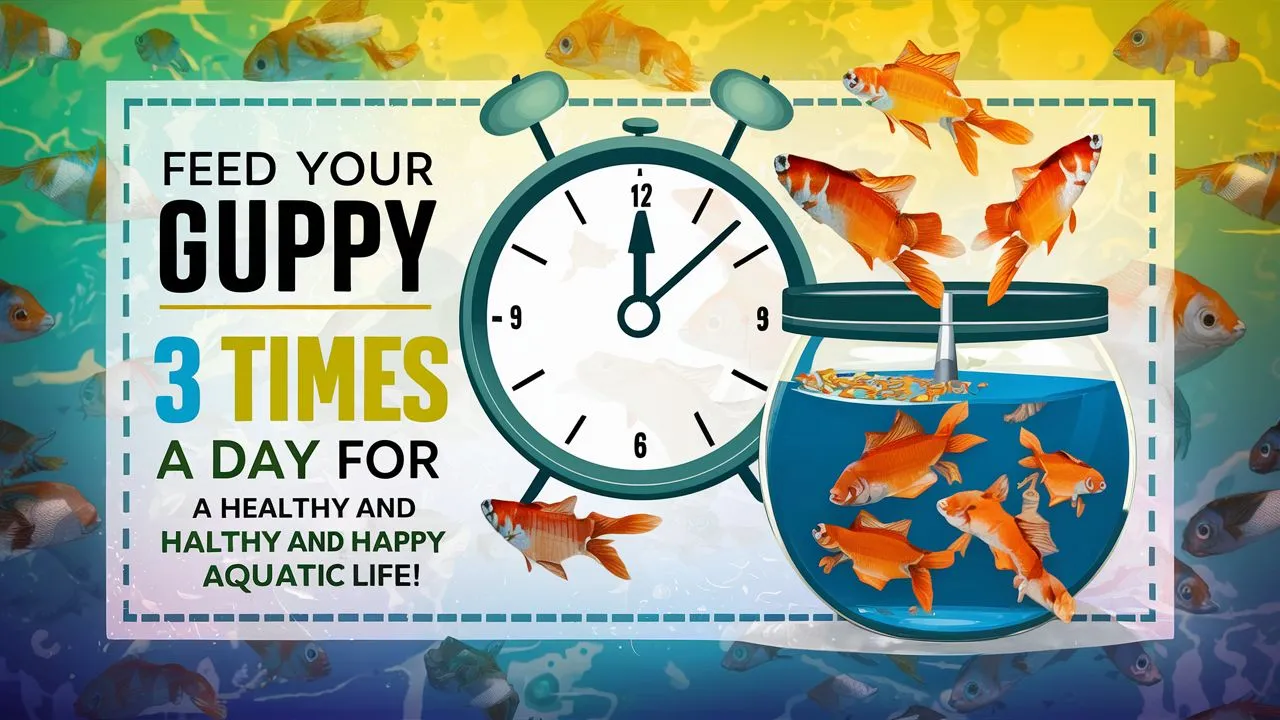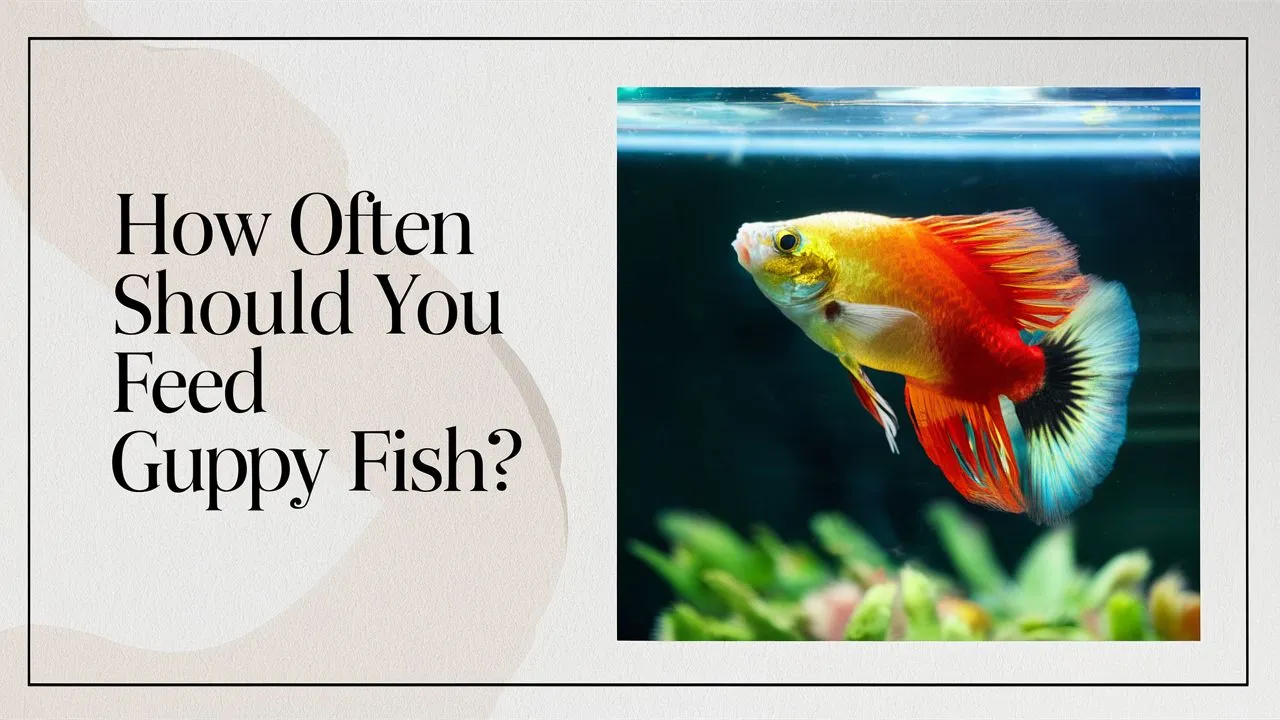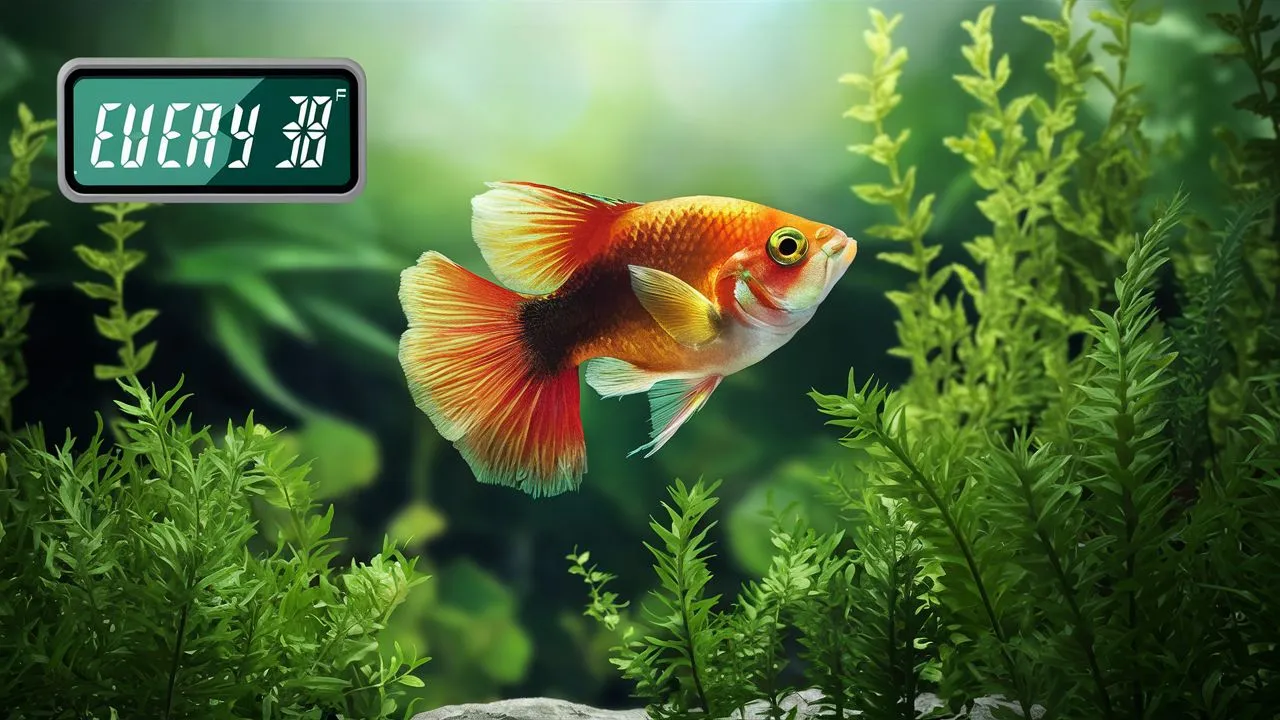Guppy fish, known for their vibrant colors and active nature, are a popular choice among aquarium enthusiasts. One of the crucial aspects of guppy fish care is their feeding schedule. This guide will delve into how often you should feed guppy fish, the types of food they require, and other related aspects to ensure their health and well-being.
How often should you feed guppy fish?
To maintain a healthy guppy fish diet, feed them two times a day, preferably in the morning and at night, with a 12-hour gap between feeds. Ensure the total eating time doesn’t exceed five minutes. Guppies can eat flake food, but high-quality brands with protein and vegetable matter are best. Supplement their diet with live or frozen foods like baby brine shrimp, blood worms, or mosquito larvae
Feeding Adult Guppies
Adult guppies require a balanced diet to ensure their health and growth. To ensure proper nutrition, it is recommended to feed them two to three small meals per day, preferably in the morning and at night, with a twelve-hour difference between the two. Each meal should consist of high-quality flake or pellet food, containing both protein and vegetable matter, and have natural color enhancers. To ensure a variety of nutrients, supplement their flake or pellet food with live or freeze-dried foods like brine shrimp, daphnia, mosquito larvae, and bloodworms. Additionally, provide vegetables such as lettuce, peas, and cucumbers, but chop or grate them into small pieces.

Overfeeding adult guppies can lead to water quality issues and health problems, so it is crucial to only feed them as much as they can eat in a few minutes and remove any uneaten food from the tank. Observe your guppies and adjust their feeding schedule accordingly, as the quantity and frequency of feeding can vary depending on factors such as tank size, fish number, age, and activity level.
Baby guppies, also known as fry, require a different feeding schedule than adult guppies. They need to eat more frequently and in smaller portions to support their growth and development. For the first six weeks, feed them every 2-3 hours, with 5-6 times a day when they are very small. After six weeks, decrease feedings to every 4-5 hours, 3-4 times per day.
To ensure they get all the nutrients they need, use commercial fry food, crushed flakes, or powdered pellets as the staple diet. Supplement their diet with live or freeze-dried foods like brine shrimp, daphnia, mosquito larvae, and bloodworms. Feed them vegetables like lettuce, peas, and cucumbers, which are high in fiber and help prevent constipation and bloating. Chop or grate vegetables into small pieces for easy swallowing.
Avoid overfeeding baby guppies to prevent water quality issues and health problems. Only feed them as much as they can eat in a few minutes and remove any uneaten food from the tank using a turkey baster or a small net.
As omnivore fish, guppies need a diet rich in both plant and animal items. Feeding them quality flakes or pellets as a main course, frequently supplemented with freeze-dried or live foods and vegetables, gives them a nice balance. Guppies’ colour can be improved by flakes or pellets that are high in nutrients like spirulina, algae, krill, prawns or fish meal. Foods high in protein, such as brine shrimp, daphnia, bloodworms or insect larvae, either live or freeze-dried, encourage faster and healthier growth in guppies. Vegetables that are high in fibre, such as lettuce, peas, and cucumbers, help to reduce bloating and constipation. For optimal health and water quality, guppies should be fed in small quantities two or three times a day.
Types of Food for Guppy Fish
Guppies require a balanced diet that includes both protein and vegetable matter. Here are some recommended foods for guppies:
- Flake Food: High-quality flake food, specifically made for tropical fish, should form the base of a guppy’s diet. It’s advisable to choose brands that include both protein and vegetable matter.
- Live Food: In addition to flake food, guppies benefit from the occasional treat of live food. This can include brine shrimp, blood worms, and mosquito larvae. However, it’s essential to ensure that the live food is safe and free from harmful bacteria.
- Vegetable Matter: Guppies require vegetable matter in their diet. This can be provided in the form of shucked peas, shredded lettuce, or finely chopped cucumber.
Avoiding Overfeeding
Overfeeding can lead to serious health problems in guppies. Guppies have small stomachs but can consume large quantities of food when available. If overfed, they can develop a blocked intestine, a bulging chest due to excess fat in the diet, or other health issues.
Moreover, overfeeding can also dirty the tank water, leading to a cloudy and unclean environment for the fish. If the tank water frequently becomes dirty, it’s advisable to reduce the amount of food or the frequency of feeding.
Guppies can survive without food for up to two weeks, but this is not a regular practice. Younger guppies can survive for about one week, and baby guppies can only last for one or two days without food. If you plan to leave your guppies for a long time, make arrangements to feed them or ask someone to take care of them. Prepare your aquarium by doing filter maintenance, water change, removing decaying matter, and installing a timer for lights.
Feeding Guppies During Vacations
Guppies are essential pets for long-term care, as they can survive a week without food. To ensure their health, consider using automatic feed dispensers or feeder blocks for longer periods and ask friends or neighbors to feed them once every two or three days.
Feeding and Caring for Young Guppies
Guppies, particularly young ones, require special care and feeding. To ensure their safety, it’s recommended to create a separate breeding tank divided into two sections using a net. These fry should be fed a combination of protein sources and vegetable matter, such as baby brine shrimp, microworms, beef heart, and egg yolk and water. Vegetable matter can be provided in infusoria, fresh lettuce, or boiled spinach. Guppy fry should be fed small amounts about six times daily, and if the water becomes dirty or cloudy, the amount should be reduced.
Conclusion
Feeding guppy fish requires understanding their dietary needs and feeding habits. Whether they’re adults or fry, providing them with the right type and amount of food is essential for their health and growth. By following the guidelines mentioned in this guide, you can ensure that your guppy fish thrive in their aquatic home.


1 thought on “How often should you feed guppy fish?”